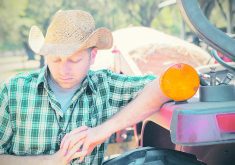If you pull out the farmer part, is there anything left?
That’s a question that plagues the minds of so many farmers and haunts the dark hours of the night if their farm is in some way “failing.”
Drought, debt, a crippling injury, a divorce — all these can cause a farm as a business to fail and the main farm operator to end up in some realm of post-farmerdom.
Related story: Recovering Farmer speaks up
Read Also

Fuel rebate rule change will affect taxes and AgriStability
The federal government recently announced updates to the fuel rebates that farmers have been receiving since 2019-20.
For some that’s a fate worse than death, and farm troubles have led to far too many farmer suicides, while others succumb to the bottle or the pills.
Gerry Friesen, who describes himself as a “recovering farmer,” is familiar with this downward spiral. He has long fought for farmers to face up to the mental health challenges they can suffer over farm troubles. The onetime chair of the Manitoba Pork Council learned a lot from the circumstances that led to him quitting farming.
Many of his insights are summed up in his just-published book, The Recovering Farmer: A Journey Through the Labyrinth of Anxiety and Depression. I popped out to see Gerry about the issue of farmer identity and how that makes some farmers suffer far more than an average person facing business or personal challenges.
“As farmers, we have a unique identity and there’s core values and beliefs that go along with that identity,” Gerry told me.
He clearly still feels connected to the farmer identity he spent more than a quarter of a century inhabiting.
In the years since he wound down his struggling hog farm in 2007, he has helped more than 600 families with debt mediation, and now heads the Manitoba Farmer Wellness Program.
“I’ve seen countless times where that identity was threatened.”
I have too, but not with farmers. I’ve seen it often with friends, colleagues and others who are or have been journalists but leave the profession at some point. They often seem haunted by almost a form of guilt for leaving journalism, especially if they have crossed to what reporters call “the dark side,” which is the field of public relations.
Instead of celebrating a new career direction, journalists moving off to communications jobs often find themselves sounding apologetic for their decisions, and often sound like they’re trying to explain it to themselves. (For what it’s worth, I don’t see anything wrong with PR and communications.)
This happens with some ministers and priests if their church closes and they end up finding non-preaching work. Professional athletes often fall off a cliff when their brief career suddenly ends.
So much of the identity becomes tied up in a calling that when they lose the job that is connected to that calling, they can experience a loss of the self. That’s what creates the inner questioning. Who am I now that what inspired me has been laid aside?
As Gerry pointed out, for many, moving on in a more fruitful direction can be the best thing that ever happens to them. Old skills can be used better in new roles. New skills can be discovered. Instead of struggling just to survive, one day at a time, a bountiful new career can begin.
Yet, for many, the guilt remains, as it did for Gerry. That’s why he half-humorously refers to himself as a “recovering farmer,” and it’s the name of his book.
This is Mental Health Awareness Month. Gerry has been doing his bit for farmer mental health ever since he left farming and began recovering from the resulting trauma.
If you’re a fellow recovering farmer, somebody who is facing the prospect of giving up farming for whatever reason, or anybody else facing the loss of a calling that has supplied much of your selfhood, it might be worthwhile checking out The Recovering Farmer. These can be lonely journeys, so it helps to have a guide.
















